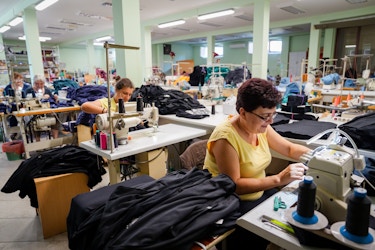Many business owners are considering reshoring, or bringing their production operations to the United States. And, while there are many benefits to reshoring your manufacturing, the decision isn’t straightforward. It takes careful financial and logistical planning to relocate a fundamental piece of your supply chain.
To understand more about manufacturing in the United States, we spoke with Matt Carson, Founder of and Managing Partner at OpenMill. OpenMill is a manufacturing directory that connects businesses with U.S.-based manufacturers, designers, and prototypers to streamline the production lifecycle.
What to consider when looking for a U.S.-based manufacturing partner
Since the pandemic, more than 60% of manufacturers say they are likely to bring manufacturing production back to North America. Competition for a U.S.-based manufacturer will be steep; as a result, it’s critical to know what you’re looking for before you start the vetting process.
Carson says there are three main factors to consider: compatibility and expertise, location, and communication. “Take your time to ensure you’re reaching out to manufacturers that match your project’s needs,” said Carson. “If possible, finding manufacturers closer to you saves in shipping costs but also the ability to go over projects in-person is helpful where applicable.”
Vet a manufacturer’s compatibility with your business by asking the following questions:
- What is their industry expertise? How many years have they been in business?
- What is their production capacity, and can it be scaled? What technology are they using?
- What certifications does the manufacturing site have? Do they have regular inspection processes in place?
- Can they refer you to existing clients or show you customer reviews?
- Is the plant close to your business or accessible to other parts of your supply chain?
[Read more: How to Find a Factory to Manufacture Your Product]
Not only will careful planning make communication easier, but it will also help with quality control.
How to ensure a smooth reshoring transition
Poor planning is a common pitfall for companies bringing their production operations back to the United States. “If the effort is poorly managed, or if the circumstances are not conducive to a smooth transition, reshoring efforts can fail,” wrote Investopedia. “Often, a company underestimates the costs and the logistical planning involved.”
Strong communication is key. To ensure your project kicks off smoothly, have your ducks in a row before you reach out to partners. “It’s your job to have your project as ready-to-go as possible before reaching out to a manufacturer. Once things are in motion, it’s important to respond quickly to factory requests, reviewing pilot runs, etc.,” said Carson.
“Before reaching out to manufacturers, ensure you have clear specifications,” he continued. “While some manufacturers can help with the prototyping stage, depending on your project, it’s generally best to start with a 3D printer or other methods based on the project’s needs. This helps you work out the kinks and helps the manufacturer with a ready-to-go plan. Good manufacturers are busy; having your plan together before reaching out helps you and the factory.”
Not only will careful planning make communication easier, but it will also help with quality control. Carson recommends that you prepare and scope all your product details ahead of time to help ensure production quality will meet your standards.
How to get started finding a U.S.-based factory
Finding potential manufacturing partners is easy. Tools like OpenMill, ThomasNet, Maker's Row, MFG, Kompass, and Oberlo can help you filter to find a list of qualified candidates. Before you vet different companies, make sure you understand your production chain.
“In many cases, you’ll need to contract with multiple factories or suppliers to complete your product. This may involve final assembly, which some manufacturers don’t do,” explained Carson. “It’s important to understand how all of these pieces will fit together. There are many examples of companies of all sizes setting up their own final assembly, starting small, and growing the operation. In other cases, you can find Contract Manufacturers who can assemble and even box your product.”
Understanding every detail of your production line will lead to more productive and fruitful conversations with your preferred partner—and allow your business to start benefiting from onshoring faster.
Check out OpenMill’s guide to turning your idea into a finished product—100% made and manufactured in the USA.
[Read more: 3 Companies Share Their 'Made in the USA' Success Secrets]
CO— aims to bring you inspiration from leading respected experts. However, before making any business decision, you should consult a professional who can advise you based on your individual situation.







